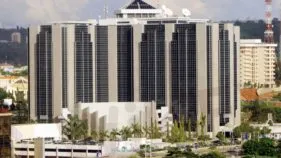简体中文
繁體中文
English
Pусский
日本語
ภาษาไทย
Tiếng Việt
Bahasa Indonesia
Español
हिन्दी
Filippiiniläinen
Français
Deutsch
Português
Türkçe
한국어
العربية
CBN to blacklist customers involved in sharp forex practices
Abstract:The Central Bank of Nigeria (CBN) says it has opened a black book for customers obtaining foreign exchange under false pretense. According to the apex bank, foreign exchange should be strictly meant for banks’ customers on genuine trips overseas, adding that those using travel documents to obtain foreign exchange and thereafter cancel their purported trips to divert the forex for other use would be blacklisted.
The Central Bank of Nigeria (CBN) says it has opened a black book for customers obtaining foreign exchange under false pretense. According to the apex bank, foreign exchange should be strictly meant for banks customers on genuine trips overseas, adding that those using travel documents to obtain foreign exchange and thereafter cancel their purported trips to divert the forex for other use would be blacklisted.

The Director of Banking Supervision, Haruna Mustafa, gave the notice via a circular yesterday, to all deposit money banks. The purpose, though not clearly stated, might be to use the list to bar some customers from accessing forex in the future.
The circular reads thus: The CBN has received and noted with concern reports of sharp practices by some unscrupulous customers to circumvent the new CBN policy on the sale of forex for overseas personal and business travel.
Some of these unwholesome practices include the use of fake visas and cancellation of air tickets after purchase of PTA/BTA. This trend, if not curbed, portends risk to the integrity and stability of the forex market.
“Consequently, further to the various measures already put in place, all banks are hereby directed to publish on their websites the names and BVN of defaulting customers who present fake travel documents or cancel their tickets and fail to return the purchased PTA/BTA within two (weeks) as stipulated in the customer declaration form signed by them.”
The CBN, had in the last two months, deployed a number of strategies to manage its failing reserves, including barring the allocation of forex to Bureaux de Change in an effort to streamline forex deployment in the country.
Disclaimer:
The views in this article only represent the author's personal views, and do not constitute investment advice on this platform. This platform does not guarantee the accuracy, completeness and timeliness of the information in the article, and will not be liable for any loss caused by the use of or reliance on the information in the article.
WikiFX Broker
Latest News
eToro Expands Nationwide Access with New York Launch
Webull Partners with Coinbase to Offer Crypto Futures
Why Is UK Inflation Rising Again Despite Recent Lows?
Hackers Charged for $11M Crypto Theft Using SIM-Swaps
Role of Central Banks in the FX Market
FCA Alerts Against Sydney FX
What Makes Cross-Border Payments Easier Than Ever?
Trader Exposes Unethical Practices by STP Trading
Interactive Brokers Launches Tax-Friendly PEA Accounts in France
Google Warns of New Deepfake Scams and Crypto Fraud
Currency Calculator


